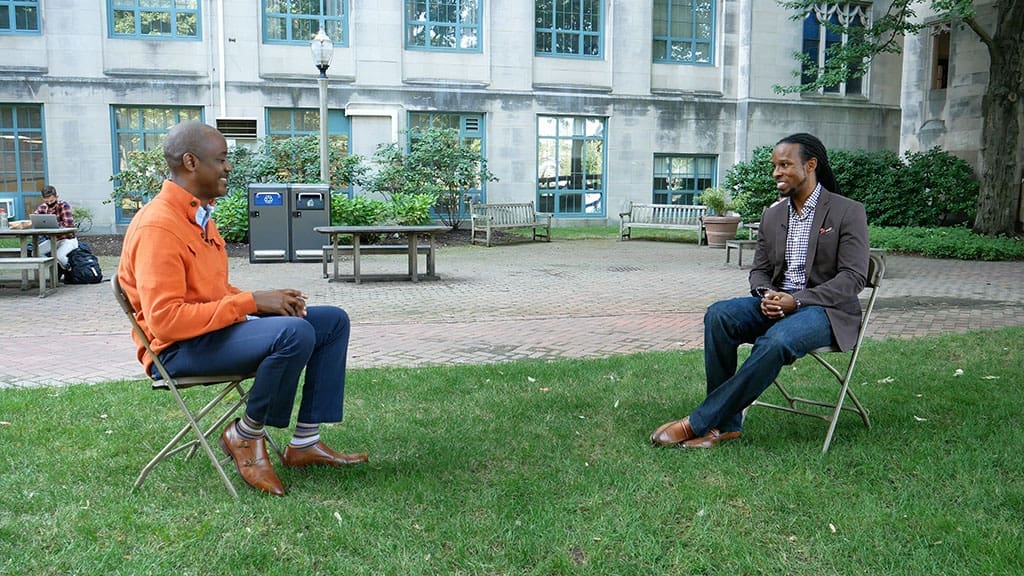Sometimes overlooked in the national hue and cry over “law and order” is that, in fact, we all want law. We all want order. The cry for law and order is not about violations of the law, but rather, about threats to a certain kind of “order” – the order of racial hierarchy in America.
I am an urbanist. I grew up in a city and have spent most of my professional career in service to cities. What I have seen firsthand is that arguments about “law and order” frequently directed at urban communities of color, generally have little to do with either.
As we approach this consequential general election, 47% of likely voters agree “law and order” is an important issue—even more than the 45 percent who cite the pandemic as the most important. With 60% of likely voters pointing to “violence and unrest” as a “major” problem, there is a clear pattern of concern.
While the national call for justice has been coupled with months of protests, this shouldn’t be the basis for these concerns. Despite media shock jocks and race baiting politicians alluding to the opposite, the data speaks for itself. The fact is that more than 90 percent of Black Lives Matter protests since the death of George Floyd were nonviolent.
The perceived link between violent unrest and the fight for racial justice isn’t a coincidence, but reflective of resistance to systemic change that would challenge the country’s racial hierarchy. Yet, this order is what needs to be challenged in America, starting with building wealth in underserved communities of color.
Racist inequities in America are baked deep into the fabric of our society, public policies, business practices and power structures. They permeate our criminal justice system, health system, and our food system, and more than 150 years after the end of legal slavery, they still define so much of the inequity in our economic system.
The racial wealth gap has remained one of the clearest examples of racist policies and practices. The typical White family has a net worth of 10 times more than that of a Black family, illustrating their significant barriers to opportunity. It takes wealth to make wealth, but Black Americans have not benefited from inter-generational access to capital and finance.
Closing the racial wealth gap begins with challenging structural causes and expanding opportunities for impacted communities.
The Boston University Center for Antiracist Research, for example, is currently working toward solutions to systemic issues that have long restricted Black people from obtaining wealth. Our recent $1.5 million commitment to the Center and its Covid Racial Data Tracker supports antiracist solutions-oriented research and data analysis, which will inform public and private policymakers.
We’re also seeking to eliminate barriers to accessing income, benefits, capital, and credit for businesses owned by Black and Latinx Americans. Small businesses promote wealth and job creation across cities and increasingly, the owners of small businesses represent the very populations of people who experience the most difficulties accessing resources. As part of a $65 million commitment to America’s working families, we made an initial $10 million commitment to help eliminate barriers to access capital and credit among small businesses operated by Black and Latinx owners in 10 cities around the US.
While we have great partners in this space, we need to see efforts like these on a larger scale if America going to put a dent in this wealth gap.
The persistent gap isn’t the only factor contributing to America’s racial hierarchy, but it’s one of the most glaring indicators of an unjust system. In fact, the racial wealth gap puts Black people, families, and communities at a disadvantage, limiting their economic power and promoting cyclical effects, with nearly 70 percent of middle-class Black children likely to fall out of the middle class as adults.
So, to quote the ancient philosophers, Unitates Publicorum, “Don’t believe the hype!” The most critical issue this election isn’t law and order, it is justice. Racial justice is what millions across the country are fighting for. It is what athletes and actors, poets and preachers, students and seniors are seeking. Even after the protests cease and athletes are no longer wearing the names of George Floyd and Breonna Taylor, antiracism must stay at the top of America’s agenda. We must continue to uplift the efforts of organizations like the New Jersey Policy Perspective, Boston UJIMA and the Real People’s Fund, who are working tirelessly to challenge economic inequality.
Along with the economic ramifications of the current pandemic, America has faced two long-standing systemic crises – inequality and inequity. Until we tackle the systems that have allowed these to persist, there can be no true law and order, because there can be no true justice. There is a better path. One in which Black and Latinx communities no longer fall victim to unevenly administered laws and the manufactured order of racial hierarchy. We must muster the collective courage to take it.
Related Updates

A Conversation on BU’s Campus: Illuminating the Racial Pandemic Within the Viral One
The Rockefeller Foundation’s Otis Rolley, Senior Vice President, U.S. Equity and Economic Opportunity Initiative, met with Dr. Ibram X. Kendi, Founder of the Center for Antiracist Research. The two discussed the goals and urgency of the Foundation’s $1.5 million grant to Boston University’s Center for Antiracist Research Center.
More